Jersey 'forever chemicals' contaminated private water supply
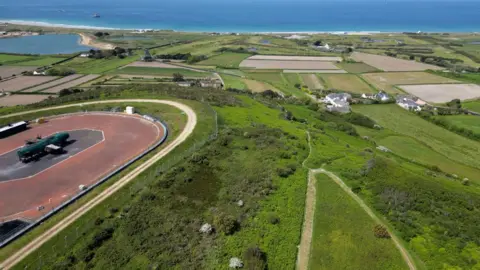 BBC
BBCOverlooking Jersey's west coastline, a cluster of farms and houses lie at the foot of the airport, but underneath the isolated and peaceful landscape is a hidden danger.
In the early 1990s firefighting foam used on the airport fire training ground leaked into the neighbouring area and private borehole water supplies.
It contained PFAS - known as "forever chemicals" because they take a long time to break down - which some researchers have linked to serious health conditions including cancer.
People living in the area believe the contaminated water damaged crops and caused a litany of ongoing serious health issues.
PFAS are found in a small quantity in most people's blood, and research is ongoing to determine if higher levels can lead to various health problems.
After the foam was confirmed to be in drinking water in 1993 the island's government and the airport, which it owns, stopped the use of the foam, and offered to install new bore holes for affected residents.
Some residents are concerned the damage to their health was already done with the chemicals because they had already consumed contaminated water.
In 2005 the Government of Jersey signed a confidential deal with 3M, the manufacturer of the foam, under which it agreed not to pursue any legal claims against the company in return for £2.6m towards the clean-up.
The deal was kept secret until a Jersey journalist obtained a leaked document in 2021 revealing details of the agreement.
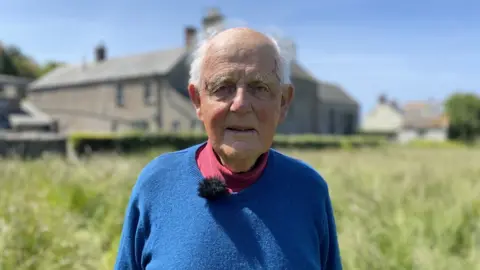
In 2006 Jersey Airport contributed about £500,000 towards bringing mains water supplies to the area and offered to pay to connect properties to ensure they had access to safe drinking water.
In December, 3M said it would stop manufacturing PFAS and work to discontinue its use in their products by the end of 2025.
'Don't even wash in it'
In 1993, farmer Ted Michel, his wife and two children, lived in one of the properties closest to the firefighting training ground.
On one sunny weekend, foam started coming out of the cold water tap at the kitchen sink: "There was virtually a head of beer which continued to overflow.
"I called public health first - they took some samples of the water - took it back to 3M who confirmed it was their foam. We were told not to even bathe in the water - 'don't even wash in it'."
Later that year, Mr Michel returned home to find the hill connecting the fire training ground and his farm covered in white foam - which destroyed his cauliflower crop.
"It was as if there'd been a snowstorm," he said.
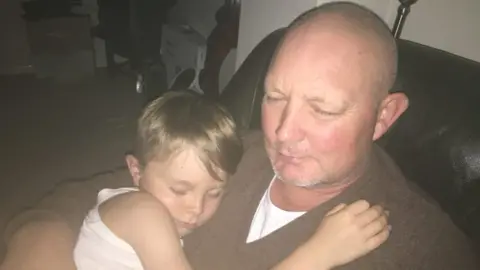 Graeme Farmer
Graeme FarmerGraeme Farmer, 57, and his family lived in a cottage just north of the training ground in the mid-1990s.
He drank water from a private borehole and believes his health problems are linked to the chemicals found in the contaminated water.
He said: "At the age of 52 I was diagnosed with a blood cancer - they said I could have possibly had it for even 20 years or longer.
"My parents… and I lived there for four years. We all went down with cancer and we all seemed to have it within the same time period."
Mr Farmer said previously there had been no known history of cancer in his family.
He said: "Three and a half years ago I went through a stem cell transplant - which was a horrendous experience for anybody to go through.
"My young son had to witness the suffering and pain that went on. It's something that's affected him to this day.
"Like everybody we'd like to see our health back. But that isn't possible - that only leaves financial compensation which everybody deserves - the States of Jersey are ultimately responsible because they took the money from 3M."
 Sarah Simon
Sarah SimonResident Sarah Simon, who grew up in the affected area at the foot of the airport, has spent years researching and campaigning for recognition of the health impact of higher levels of PFAS in blood.
She believes her auto-immune disease, skin disorders and thyroid illness are caused by the "long-term ingestion of elevated PFAS in Jersey's drinking water" and believes "these chemicals are toxic and harmful to health".
"My health has been declining for years to the point where I have constant lethargy. I am tired constantly. I can't think properly. I had to quit my job."
In neighbouring Guernsey the island's government rejected an offer of £3.25m from 3M in 2014 relating to the use of firefighting foam at Guernsey and Alderney airports.
The States of Guernsey attempted to recover up to £27m in a case heard in the High Court, but dropped its claim and settled on the advice of its legal team leaving it paying £1.4m (US$2m) towards 3M's legal costs as well as the island's own legal costs of about £6.6m.
The 2019 film Dark Waters brought the issue of PFAS contamination to the global stage, based on the true story of a lawyer who took on chemical giant DuPont over the contamination of the water supply of a small town in West Virginia with PFOA - a PFAS compound.
In 2017 DuPont settled more than 3,500 PFOA - a PFAS compound - lawsuits for a total of $671m (£526m).DuPont denied any wrongdoing and said in a statement: "We are committed to upholding the highest standards for the wellbeing of our employees, our customers and the communities in which we operate.
"In 2006, historical DuPont announced its commitment to discontinue manufacture, purchase, or use of PFOA."
Rob Bilott, the lawyer who inspired the film, said: "This is a massive public health threat.
"We're talking about chemicals that have been found in drinking water, in the soil, in air, in wildlife and in people all over the planet in levels that are raising concerns among the scientific community and regulators about the potential human health effects."
In June, 3M agreed a $10.3bn (£8bn) settlement to pay to test and clean up PFAS in water supplies in cities and towns across the United States of America. It did not admit liability.
The US Environmental Protection Agency found PFAS "can cause serious health problems, including cancer" and the US government proposed its first restrictions on PFAS levels in drinking water in March.
The European Environment Agency said most PFAS chemicals were considered moderately to highly toxic, particularly for children's development.
Last year Jersey's government offered to test the blood of people living near the airport for PFAS compounds - one of the only places in the world to conduct such a programme.
They found of the 88 islanders tested 70% had higher than threshold levels of PFHxS and 30% had higher than threshold levels of PFOS in their blood - both are PFAS compounds.
The threshold used was above the levels found in 95% of the population of the US, which has carried out extensive testing into the chemicals' impact on health.
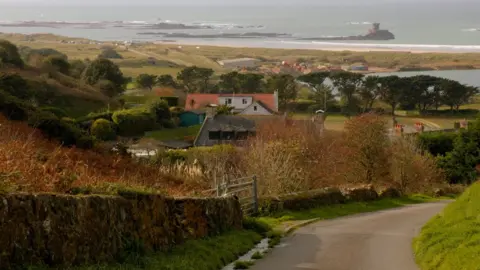
According to Prof Peter Bradley, Jersey's director of public health: "We're in a bit of a grey area. Most of the international research is showing there is a link between PFAS and poorer health but it's not proving that PFAS is the cause.
"There is an awful lot of overlap. There is increasing international concern. We need to make sense of it here in Jersey and what's right for our population. We need to sort the good research from the poorer quality research."
Ms Simon said: "The option for PFAS blood tests island-wide should be made available.
"Our lives have all been affected. I believe islanders across Jersey will have suffered health injury due to ingesting elevated levels of the various PFAS found on water and local produce."
Jeremy Snowdon, who has lived in the area since the 1980s, said: "I am very concerned. At the moment there are no known treatments to reduce levels [in blood].
"What options are there for me? How can I minimise it? The government need to accept that this is their problem and they need to do something about it."
One resident, who wanted to remain anonymous, had a test result higher than the threshold. She has been diagnosed with an autoimmune disease called fibromyalgia, and is awaiting further tests from doctors for other symptoms, but is also concerned about her son.
She said: "My first concerns were my son's skin problems, from bathing, playing in the water here or on the beach from about 2005. I was concerned about my health from about 2010.
"I have been asking questions relating to health and environment issues for many years now - a lot of them unanswered or brushed under the carpet. My motivation is that my family is ill… you can hurt me but you don't hurt my children."
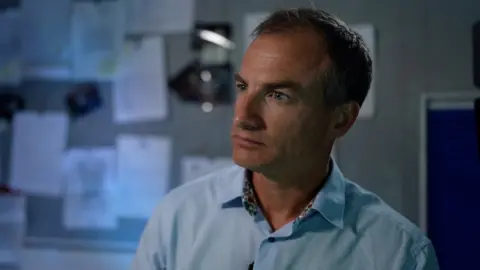
Many residents are critical of the government's deal with 3M in which it agreed to "forever release, acquit, discharge, and covenant not to sue 3M or any 3M entity in relation to any and all airport claims".
It also includes a commitment for the government to support the company if any resident pursued legal action.
Journalist Julien Morel, who works for Bailiwick Express, grew up just outside the affected area.
A copy of the deal that had been kept hidden from public scrutiny was leaked to him enabling him to break the story in 2021.
"I was surprised that a government would be willing to commit to work against their own residents should they feel as though they want to make a case," he said.
Not included in the government testing, he had a private test done in Germany which found the levels in his blood were three times higher than their national standard.
Mr Morel said: "I have some sympathy for the government at the time. This was an out. They had to clean up the fire training ground. You've also got to remember at the time that the links with potential cancer and other ailments wasn't fully known.
"In hindsight I think they made a mistake. I think the government still has the opportunity to make good the wrongs of the past."
In a statement, 3M said: "As the science and technology of PFAS, societal and regulatory expectations, and our expectations of ourselves have evolved, so has how we manage PFAS.
"We have and will continue to take action consistent with our values - including remediating PFAS, investing in water treatment, and collaborating with communities."
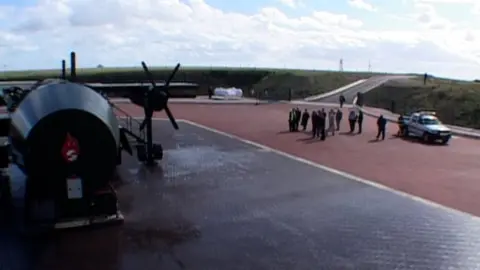
The Government of Jersey said: "There is no international agreement about how to interpret blood results, therefore it is difficult to reach conclusions on the levels in the blood that has been tested.
"We have set up the Independent PFAS Scientific Panel, who will examine, report, and make recommendations to the government on agreed topics."
The government's latest response has not inspired confidence among some of the residents affected by the contamination of their water supply more than 30 years ago.
Mr Morel said: "This journey is not yet over. I don't feel it's over. I think there's a lot more to say and a lot more to discover."

Follow BBC Jersey on Twitter and Facebook. Send your story ideas to [email protected].
